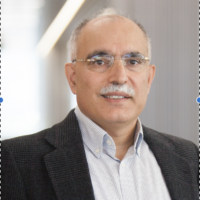Expanding the Pipeline: Distributed REsearch Apprenticeships for Master’s (DREAM)
The Distributed REsearch Apprenticeships for Master’s (DREAM) is a pilot NSF program being offered by a nationwide consortium of colleges and universities that have created “bridge to MS in CS” programs for students with non-CS bachelor’s degrees. Schools in the MSCS Pathways to Computing Consortium provide a new pathway for people who studied something other than CS as undergraduates to enter the tech field. The strong emphasis of this effort is to provide a new pathway into computing for individuals from populations historically minoritized in tech (women, LGBQTIA, Black/African American, Hispanic/Latino, Native American/Hawaiian/Alaskan/Asian Pacific Islander students, and students with disabilities). Consortium members sign a membership agreement that, among other things, confirms their commitment to increasing the diversity of their graduate programs. Students in these Consortium pathways come from a wide array of undergraduate backgrounds that span the STEM disciplines, humanities, social sciences, business, and the arts.
The MS in CS for non-majors presents an exciting opportunity to recruit a new population of students into computing PhD programs. With DREAM, Consortium students engage in semester-long research projects. They receive $12,000 stipends as well as mentoring, professional development, and cohort community activities. The goal of DREAM is to increase the number of students pursuing a PhD in CS who are from groups historically minoritized in tech and, in so doing, diversify computing departments themselves.
The demand for participating in DREAM from students at the Consortium schools (13 at the time) was high. In total, 149 students from the 13 universities applied: 67 (45%) were women and 21 (14%) were students from other groups historically minoritized in tech. From these applications, 50 students (33% accept ratio) were accepted into DREAM and 43 (86% commit ratio) participated (19 (44%) of whom were women and eight (19%) from other groups historically minoritized in tech). The 43 students, who have been funded by an NSF grant (16 students) and two foundation partners (27 students), are from the following nine Consortium member schools: Clemson University, Colorado School of Mines, Columbia University, DePaul University, Northeastern University, Tufts University, University of California at Riverside, University of Illinois at Urbana-Champaign, and University of North Texas.
Of the 43 students participating in the DREAM pilot this year, 30 students worked on their research experience during summer 2022 and the other 13 will complete their DREAM during the 2022-23 academic year. Each student is matched with both a faculty advisor and a mentor and all advisors and mentors participate in a training on research-based mentoring practices for students historically minoritized in tech. In addition, DREAM students engage in virtual community activities during their DREAM experience.
DREAM draws its inspiration from CRA-WP’s Distributed Research Experiences for Undergraduates (DREU) program, which has been successful at encouraging undergrads from diverse backgrounds to enroll in CS graduate programs. Will DREAM be as successful as DREU? This question will be answered via surveys, interviews, and comparisons with the national Data Buddies survey. Early survey results from the Summer 2022 students are promising; for example, for the 20 DREAM summer students who completed both the pre and post-surveys, there was a significant improvement in research confidence. In addition, there was a significant positive change in response to the question “I plan on pursuing a PhD to become a university professor”.
In the coming months, evaluation of the DREAM pilot will be extended to include students who are doing their research experience this fall. Early next year, CRA’s Center for Evaluating the Research Pipeline (CERP) will begin a comparative evaluation of DREAM participants with non-participants. While evaluation and analysis are ongoing, the DREAM pilot has already demonstrated a strong demand for research experiences among non-traditional Master’s students. Because of that demand and the positive indications from the first evaluation, CRA-WP (with initial support from NSF) plans to scale the DREAM program nationally. Members of the MSCS Pathways Consortium will work with CRA-WP to leverage the NSF funding to raise philanthropic funds in order to meet student demand.
Four quotes from students who participated in DREAM this summer are included below. The four students are from four different institutions and all four identify with a population historically minoritized in tech.
The DREAM program gave me the unique opportunity to explore my research interests with the kind of funding that is generally only available for REU programs or PhD students. It filled a necessary gap in support for non-traditional grad students such as myself, which gave me the space to explore research at the graduate level and cemented my plan to pursue a PhD in computational biology.
This program has changed my perception of research as well as the way I speak to other women who are considering research.
I have decided to pursue a MS thesis since completing my DREAM research in order to expand on my summer research.
I am so grateful for this experience and the opportunity to be part of a team that is working on overcoming the communication barriers between deaf and hearing.
About the Authors
Tracy Camp
Dr. Tracy Camp is CRA’s Executive Director. Camp joins CRA from Colorado School of Mines, where she was a member of the faculty since 1998, and Department Head of Computer Science at Mines since 2016. Camp’s research interests are in wireless networking. She is most known for improving the credibility of wireless networking simulation studies. More than 4,000 researchers in 88 countries/regions have downloaded at least one of the twelve software packages developed by her research group (as of June 2021) and her research articles have been cited 14,794 times (per Google Scholar, as of June 2021).
Camp has received over 20 grants from the National Science Foundation, including a prestigious CAREER award. In total, her projects have received over $20 million dollars in external funding.
Camp is an ACM Fellow, an IEEE Fellow, and an ACM Distinguished Lecturer. She was a Fulbright Scholar in New Zealand in 2006, and a Distinguished Visitor at the University of Bonn in Germany in 2010. She earned her B.A. in mathematics at Kalamazoo College, M.S. in computer science from Michigan State University, and Ph.D. in computer science from the College of William and Mary.
Catherine Gill
Catherine is managing director for Northeastern’s Center for Inclusive Computing (CIC), where she oversees strategy, partnerships and fundraising. The CIC’s mission is to materially increase the representation of women of all races and ethnicities earning computing degrees. Prior to this role, Catherine was managing director of the Align Program, a Master’s in computer science specifically designed for individuals who did not study computing as undergraduates.
Before Northeastern, Catherine was executive vice president at Root Capital, a social enterprise that provides financing to agricultural businesses in Latin America and sub-Saharan Africa, and where, among other things, she helped launch the Women in Agriculture Initiative.
Catherine holds an MBA from the Instituto de Estudios Superiores de la Empresa (IESE) in Barcelona, Spain, and a B.A. in ancient Greek from Wellesley College. She is the board chair of the Criterion Institute, a think tank that seeks to use finance as a tool for social change.










